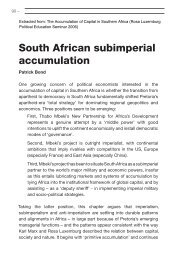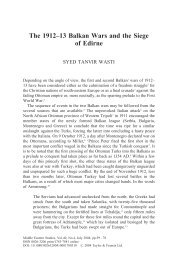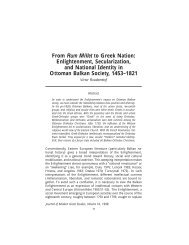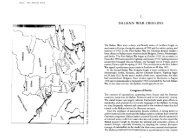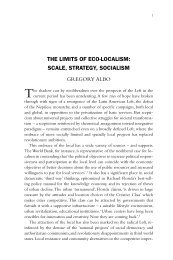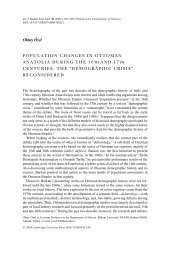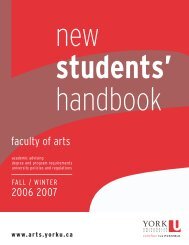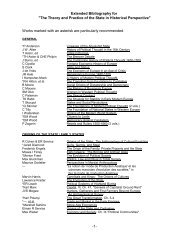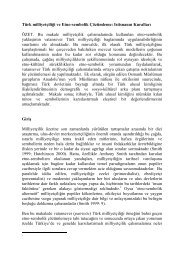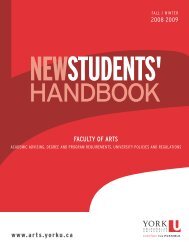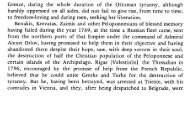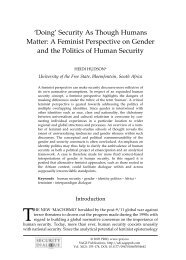FYCSG 05/06 REV2 - Faculty of Arts - York University
FYCSG 05/06 REV2 - Faculty of Arts - York University
FYCSG 05/06 REV2 - Faculty of Arts - York University
Create successful ePaper yourself
Turn your PDF publications into a flip-book with our unique Google optimized e-Paper software.
AS/SOSC1510 9.0 The Future <strong>of</strong> Work. This course studies the emerging patterns <strong>of</strong><br />
work in Canadian society. It provides a comprehensive understanding <strong>of</strong> the postwar<br />
work world, the causes <strong>of</strong> its breakdown, changing values and identities, and<br />
competing scenarios for work, leisure and unemployment. (This course is affiliated with<br />
Calumet College.)<br />
AS/SOSC1520 9.0 Markets and Democracy. The development <strong>of</strong> industrial capitalism<br />
has entailed pr<strong>of</strong>ound changes in ways <strong>of</strong> living. The course will consider the spread<br />
<strong>of</strong> the market economy, the industrialization <strong>of</strong> production and the associated transformation<br />
<strong>of</strong> social and political institutions and ideas. (This course is affiliated with<br />
McLaughlin College.)<br />
AS/SOSC1650 9.0 Introduction to Criminology. This course is an introduction to criminology<br />
through a critical investigation <strong>of</strong> the processes and structures that designate<br />
criminality and delinquency; the relationship between control and consent; the administration<br />
<strong>of</strong> “justice”, and; the contexts (cultural, political and economic) for legal<br />
contests. (Cross-listed to AS/CRIM1650 9.0.) (This course is affiliated with McLaughlin<br />
College.)<br />
Note: Open to Criminology majors only.<br />
Degree credit exclusion: AS/SOCI1011 6.0.<br />
Note: Students must achieve at least a grade <strong>of</strong> B (6.0) in this course (or equivalent)<br />
in order to be permitted to continue as a Major in Criminology, or to pursue additional<br />
Criminology courses at the 2000, 3000 and 4000-levels. Under exceptional<br />
circumstances, non-majors who have not obtained at least a grade <strong>of</strong> B (6.0) may<br />
apply for special consideration to enrol in a Criminology course for which<br />
AS/CRIM/SOSC1650 9.0 (or equivalent) is a prerequisite. This application should be<br />
made to the Criminology program coordinator.<br />
AS/SOSC1731 9.0 Cybercities. Technology’s impact on cities is examined, with emphasis<br />
on institutions and landscapes. Changes <strong>of</strong> metropolitan form, issues <strong>of</strong> community<br />
formation, and emerging patterns <strong>of</strong> work, leisure and urban life are explored in the<br />
context <strong>of</strong> shifting modes <strong>of</strong> electronic communication. (This course is affiliated with<br />
Calumet College.)<br />
Note: This course requires internet access.<br />
AS/SOSC1740 9.0 Development <strong>of</strong> Urban Economies. This course compares urban<br />
economic development in Canada and the Third World in terms <strong>of</strong> industrialization,<br />
urbanization and economic dependency. Themes are: colonial cities and industrial<br />
dependence; the multinational corporation, technological dependence and urban<br />
employment; urban problems and alternative solutions. (This course is affiliated with<br />
Calumet College.)<br />
AS/SOSC1910 9.0 Education and Social Change. This course examines the development<br />
<strong>of</strong> educational systems against the background <strong>of</strong> a changing social structure. The<br />
question <strong>of</strong> “education for what” is stressed in understanding historical and contemporary<br />
school systems. The course emphasizes the Canadian educational experience.<br />
(This course is affiliated with Vanier College.)<br />
AS/SOSC1960 9.0 Introduction to Modern Social and Political Thought. This course<br />
provides a broad introduction to the interdisciplinary study <strong>of</strong> modern social and<br />
political thought. Through critical reading and analysis <strong>of</strong> primary texts, students<br />
become familiar with the rise <strong>of</strong> the liberal tradition, focusing on critiques, defenses<br />
and developments <strong>of</strong> its conceptions <strong>of</strong> the modern world. (This course is affiliated with<br />
Stong College.)<br />
Degree credit exclusion: AS/SOSC1990B 6.0.<br />
Sociology<br />
As one <strong>of</strong> the liberal arts and social sciences, the discipline <strong>of</strong> sociology contributes to selfcomprehension<br />
and the understanding <strong>of</strong> society by developing a body <strong>of</strong> knowledge<br />
concerning its structure, dynamics, and symbolic orders. An undergraduate specialization<br />
in sociology provides a basis for graduate study and pr<strong>of</strong>essional careers in fields such<br />
as university research and teaching in sociology, law, secondary school teaching, social<br />
research, administration, and various social services. Though the members <strong>of</strong> the Department<br />
<strong>of</strong> Sociology teach a wide range <strong>of</strong> materials and perspectives on society in general<br />
and on Canadian society in particular, we take social criticism in theory development,<br />
research, and teaching to be an essential element <strong>of</strong> our work.<br />
AS/SOCI1010 6.0 Sociological Perspectives. An introduction to basic sociological<br />
concepts and theoretical frameworks used to understand the social structures and<br />
cultures that transcend and shape personal experience. Focusing on Canadian society<br />
in historical and comparative context, topics include power, differentiation, social<br />
control and socialization.<br />
Note: Sociology majors must take this course within their first 48 credits.<br />
SUGGESTED COURSE SELECTION FOR FIRST YEAR.<br />
(ASSUMES A COURSE LOAD OF 30 CREDITS):<br />
• 1000-level 9 credit Foundations HUMA or SOSC course;<br />
• AS/SOCI1010 6.0;<br />
• 1000-level 6 credit NATS course;<br />
• 6 credit elective course;<br />
• 3 credit elective course (optional).<br />
South Asian Studies<br />
The purpose <strong>of</strong> this program is to enable students interested in South Asia (embracing,<br />
for now, studies related to Bangladesh, Bhutan, India, Nepal, Pakistan and Sri Lanka) to<br />
pursue this interest through a series <strong>of</strong> course <strong>of</strong>ferings drawn from a number <strong>of</strong> different<br />
disciplines. While the chief focus <strong>of</strong> the program will be the countries that comprise<br />
the South Asian region, it is important that issues related to diasporic life be included in<br />
the program in view <strong>of</strong> the large South Asian diaspora in Canada. Thus, it will be possible<br />
for majors and minors to choose a proportion <strong>of</strong> their required program courses from a<br />
variety <strong>of</strong> extant courses that focus on the diaspora. We expect that this option will<br />
increase the attraction and uniqueness <strong>of</strong> the program. Our survey <strong>of</strong> extant South Asian<br />
Studies programs in North America reveals that there is <strong>of</strong>ten a polarity in their pedagogy:<br />
they focus either on the study <strong>of</strong> the region or on diasporic issues. Given the particular<br />
strength <strong>of</strong> <strong>York</strong>’s South Asian Studies faculty, we are in a position to combine these two<br />
elements in order to <strong>of</strong>fer a unique program <strong>of</strong> study.<br />
SUGGESTED COURSE SELECTION FOR FIRST YEAR.<br />
(ASSUMES A COURSE LOAD OF 30 CREDITS):<br />
• 1000-level 9 credit Foundations HUMA or SOSC course;<br />
• Introductory course towards Major 1 (usually 6 credits);<br />
• 1000-level 6 credit NATS course;<br />
• 6 credit elective course or 6 credit introductory level course from the South Asian<br />
Studies list <strong>of</strong> courses;<br />
• 3 credit elective course (optional).<br />
Undeclared Major<br />
The undeclared major option is available to new first year students in the <strong>Faculty</strong> <strong>of</strong><br />
<strong>Arts</strong> in order to provide an opportunity to explore the broad range <strong>of</strong> courses and<br />
programs available in the <strong>Faculty</strong> and at <strong>York</strong>. <strong>York</strong>’s curriculum supports and encourages<br />
such experimentation, which allows students the time to find the right mix <strong>of</strong> courses,<br />
and helps to achieve a balanced program <strong>of</strong> studies. First year students in the undeclared<br />
major option should take a combination <strong>of</strong> potential major courses and general education<br />
courses. Any course taken as a potential major which is then not chosen as a major<br />
program <strong>of</strong> study would become an elective course. Students must choose a Major/Minor<br />
program <strong>of</strong> study once they have successfully completed 24 credits, and subsequent<br />
changes are possible.<br />
SUGGESTED COURSE SELECTION FOR FIRST YEAR.<br />
(ASSUMES A COURSE LOAD OF 30 CREDITS):<br />
• 1000-level 9 credit Foundations HUMA or SOSC course;<br />
• 1000-level 6 credit NATS course;<br />
• Introductory course towards potential Major (usually 6 credits);<br />
• Introductory course towards potential Major (usually 6 credits);<br />
• 3 credit elective course (optional).<br />
28




